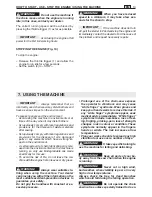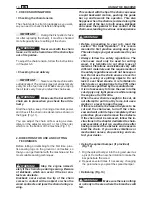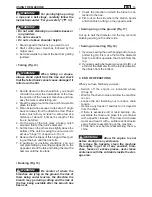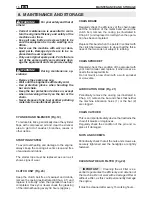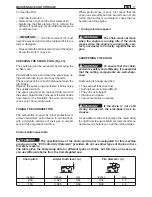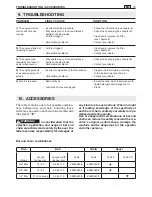
•
Follow the manufacturer’s sharpening and main-
tenance instructions for the saw chain.
Decreasing
the depth gauge height can lead to increased kickback.
H) CHAIN-SAW OPERATING TECHNIQUES
Always observe the safety regulations and use the most
suitable sawing techniques.
J) RECOMMENDATION
FOR THE FIRST-TIME USERS
Before felling or delimbing for the first time, make sure:
– you have been specifically trained to use this type of
equipment;
– you have carefully read the safety regulations and user
instructions contained in this manual;
– you practise first on logs on the ground or attached to
trestles, in order to get familiar with the machine and the
most suitable cutting techniques.
K) HOW TO READ THE MANUAL
Certain paragraphs in the manual contain particularly sig
-
nificant information and are marked with various levels of
highlighting with the following meaning:
NOTE
or
IMPORTANT
These give details or further infor-
mation on what has already been indicated, and aim to
prevent both damage to the machine, and the machine
from causing damage.
WARNING!
Non-observance will re sult in
the risk of injury to oneself or others.
DANGER!
Non-observance will re sult in
the risk of serious injury or death to oneself or oth-
ers.
3.1 WORKING WITH TREE SERVICE CHAIN-SAWS
FROM A ROPE AND HARNESS
This chapter sets out working practices to re du ce the risk
of injury from tree service chainsaws when working at
height from a rope and harness.
While it may form the basis of guidance and trai ning litera
-
ture, it should not be regarded as a sub stitute for formal
training.
General requirements working at height
Operators of tree service chainsaws working at height
from a rope and harness should never work alone.
A competent ground worker trained in appro pria te emer
-
gency procedures should assist them.
Operators of tree service chainsaws for this work should
be trained in general safe climbing and work positioning
techniques and shall properly e quipped with harnesses,
ropes, strops, karabiners and other equipment for main
-
taining se cu re and safe working positions for both them
-
selves and the saw.
Preparing to use the saw in the tree
The chainsaw should checked, fuelled,
started and warmed up by the ground
worker before it is sent up to the opera
-
tor in the tree.
The chainsaw should be fitted with a
s u i t a b l e
strop for
atta ching
to the op
-
erator’s harness:
a) choke the strop around the attachment point on the
rear of the saw (A);
b) provide suitable karabiners to allow indirect (i.e. via
the strop) and direct attachment (i.e. at the attachment
point on the saw) of saw to the operators harness;
c) ensure the saw is securely attached when it is being
sent up to the operator;
d) ensure the saw it secured to the harness before it is
disconnected from the means of a scent.
The saw should only be attached to the recommended
attachment points on the harness. These may be at mid-
point (front or rear) or at the sides.
Where possible attaching the saw to centre rear mid-point
will keep it clear of climbing lines and support its weight
centrally down the operator’s spine.
When moving the saw from any at
-
tachment point to another, opera
-
tors should ensure it is se cured in
the new position before releasing
it from the previous attachment
point.
These can be found on the
midpoint (front or rear) or on the
sides.
When possible, fasten the chain-
saw to the rear central midpoint to
prevent it from interfering with the
climbing ropes and make sure it supports the operator’s
weight in the middle, toward the bottom of the operator’s
spinal cord.
When moving the chain-saw from one fastening point to
another, it is advisable that operators are sure they are
fastened to a new position before unfastening from the
previous fastening point.
Using the chainsaw in the tree
SAFETY REQUIREMENTS
7
EN





















